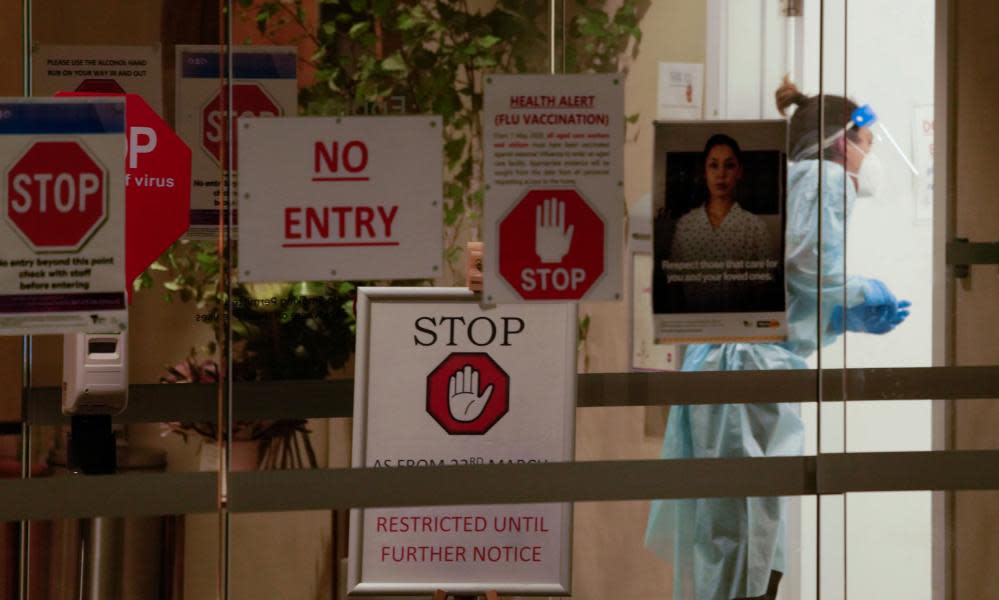Older people and families should not have to put up with the secrecy of the aged care sector

Refusing to publicly name aged care homes with Covid-19 outbreaks; secrecy around the number of deaths in specific aged care homes; information about standards of care and complaints about aged care homes considered “commercial-in-confidence”; voting against reforms that would spell out what the $13bn of taxpayers’ money given each year to aged care providers is actually spent on.
This government has a long history of being more concerned about the reputational damage of aged care providers – some of whom are multinational corporations – than looking after the interests of those living in residential aged care, most of whom are elderly and frail.
Related: Millions for aged care investors, but homes lack nurses: where does $13bn in federal funding go?
The aged care minister Richard Colbeck caused himself significant reputational damage when he appeared before a Senate inquiry and could not name how many residents had died in aged care homes, nor how many homes had outbreaks. While a staffer proffered that specific information on his behalf, the federal government continues to refuse to name the aged care homes in Victoria with outbreaks or how many residents have died in these homes.
Dr Brendan Murphy, secretary of the Department of Health, and Colbeck explained that providers did not want to be publicly named because they were worried about “reputational damage”.
Is it the role of the health department and federal government to protect private aged care homes from reputational damage? Imagine the government refusing to tell the public which schools, workplaces, restaurants or childcare centres had Covid outbreaks because of concerns about “reputational damage”.
Each day, the Victorian government names the 10 aged care homes in Victoria with the largest outbreaks. We know the number of cases linked to Epping Gardens, St Basil’s Homes for the Aged and Baptcare Wyndham Lodge Community. However, we don’t know how many of these cases are residents. We also don’t know how many residents have died in each of these aged care homes.
This secrecy and favouring of corporate interests is all too consistent with what aged care “consumers” have long had to put up with. Consider the way the Aged Care Quality and Safety Commission handles complaints. The commission does not share with the public complaints made against individual aged care homes.
Instead, the commission releases a quarterly report with the number of complaints and the types of complaints. In its most recent report before the pandemic (January to March 2020), there were 1,414 complaints. The most frequent complaints concerned medication management, hygiene, falls, number of staff and staff conduct.
The public is entitled to know the names of the aged care homes associated with these complaints. Would you choose a home for a loved one if you knew there had been numerous complaints about medication errors or staff conduct?
Requiring each aged care home to publish a report at the end of each month on the number of complaints received and how each complaint was resolved would undoubtedly help aged care consumers to assess standards of care when choosing a home. But this is clearly a bridge too far for the Aged Care Quality and Safety Commission.
Furthermore, in this market-based system so beloved of the Coalition, older people and families are denied access to vital information to inform their choice of aged care home.
The most important indicator of standards of care in an aged care home is the number of staff and their training. However, aged care homes are not required to disclose staff numbers and qualifications. How can people make informed decisions about standards of care when they do not have access to this vital piece of information?
It is not only information about staff numbers. The public also needs information on a range of quality indicators such as pressure sores, weight loss, falls, infection rates and admissions to hospitals. Yet information related to residents’ safety and wellbeing has been deemed “commercial-in-confidence”.
In 2019 the Queensland Labor government announced that aged care homes must publish their staff numbers. The federal government opposed this. They produced a six-page submission arguing that it might “confuse or mislead” families and “appears to create a reporting burden on providers, with no clear benefits to consumers”.
Related: Why did we expect aged care to cope amid Covid when it was struggling before it? | Sarah Russell
In December Stirling Griff from the Centre Alliance tabled three critical amendments to the aged care legislation amendment (new commissioner functions) bill 2019 to improve transparency and accountability around complaints and transparency about finances in aged care homes. The Coalition voted against all three amendments.
Without financial transparency, the public has no way of knowing how providers spend the government subsidy, which is now $13bn each year. Do they spend it on nursing care, meals and activities for residents or on salaries for their executive team?
The public should be told exactly how much is spent on looking after the most vulnerable in our community. After all, it’s taxpayers’ money. We need figures showing exactly what percentage of this money accounts for the profits of the aged care industry. However, providers do not want the public to know how our taxes are spent. They feel entitled to keep this financial data top secret.
After the appalling publicity associated with so many preventable deaths of residents due to Covid-19, private providers have launched a public relations campaign to “change the conversation” about aged care and “win the hearts and minds of middle Australia”. However, the aged care sector needs reform, not a PR campaign. It is disappointing that the Coalition government’s idea of aged care reform is simply to give the sector more money. PR spin and money is a lethal combination.
• Dr Sarah Russell is a public health researcher and aged care advocate

 Yahoo News
Yahoo News 
